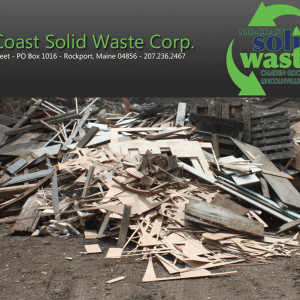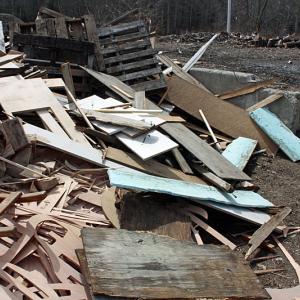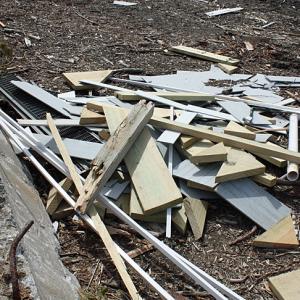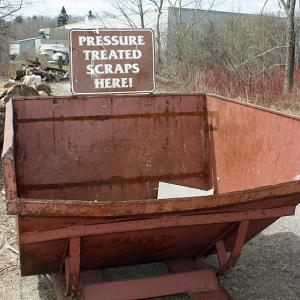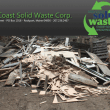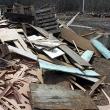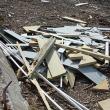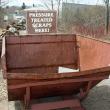Mid-Coast Solid Waste restarting demolition wood diversion program
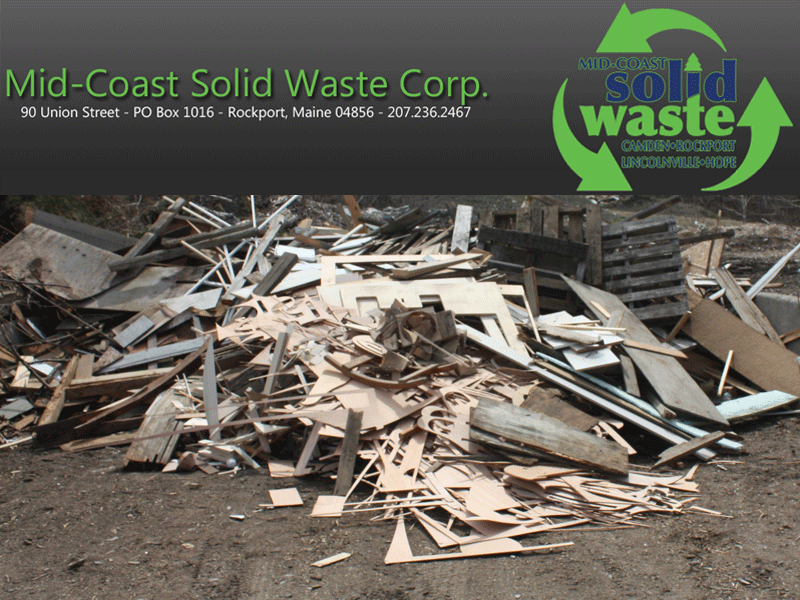 For the Mid-Coast Solid Waste Corp.’s demolition wood diversion program to work, people need to only place demolition wood on the pile. Not Blueboard or drywall, not plastic pipe, not iron or metal sheathing or by all means, not pressure treated wood. (Photo by Holly S. Edwards)
For the Mid-Coast Solid Waste Corp.’s demolition wood diversion program to work, people need to only place demolition wood on the pile. Not Blueboard or drywall, not plastic pipe, not iron or metal sheathing or by all means, not pressure treated wood. (Photo by Holly S. Edwards)
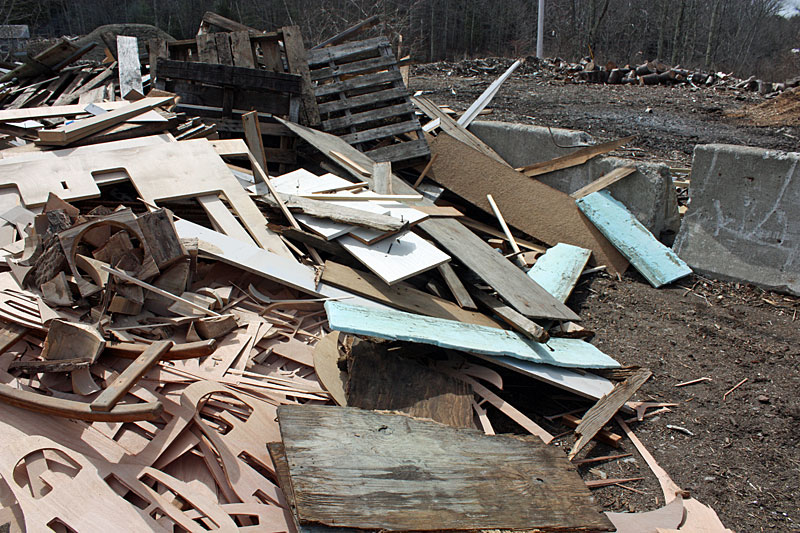 The transfer station’s demolition wood pile Tuesday morning contained sheets of Blueboard insulation, which the facility is asking people to be sure and not place in the pile. (Photo by Holly S. Edwards)
The transfer station’s demolition wood pile Tuesday morning contained sheets of Blueboard insulation, which the facility is asking people to be sure and not place in the pile. (Photo by Holly S. Edwards)
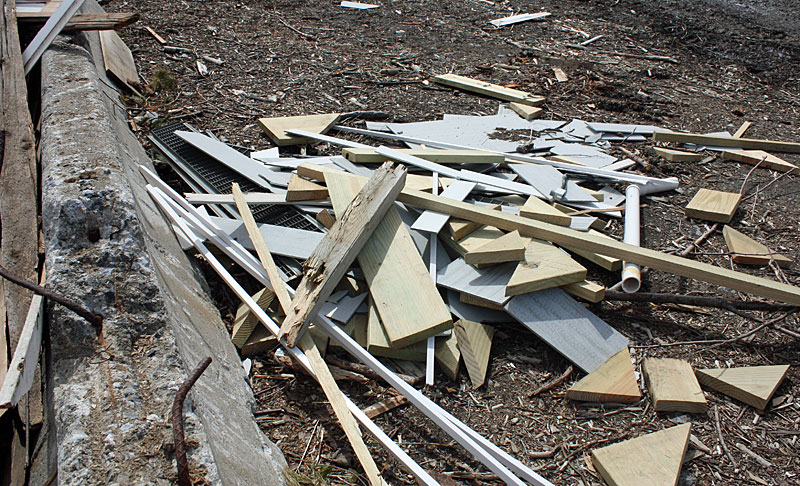 Mid-Coast Solid Waste Corp. manager Jim Guerra has started a secondary pile of non-demolition wood that people have put into the pile, and it contained a variety of disqualified components. (Photo by Holly S. Edwards)
Mid-Coast Solid Waste Corp. manager Jim Guerra has started a secondary pile of non-demolition wood that people have put into the pile, and it contained a variety of disqualified components. (Photo by Holly S. Edwards)
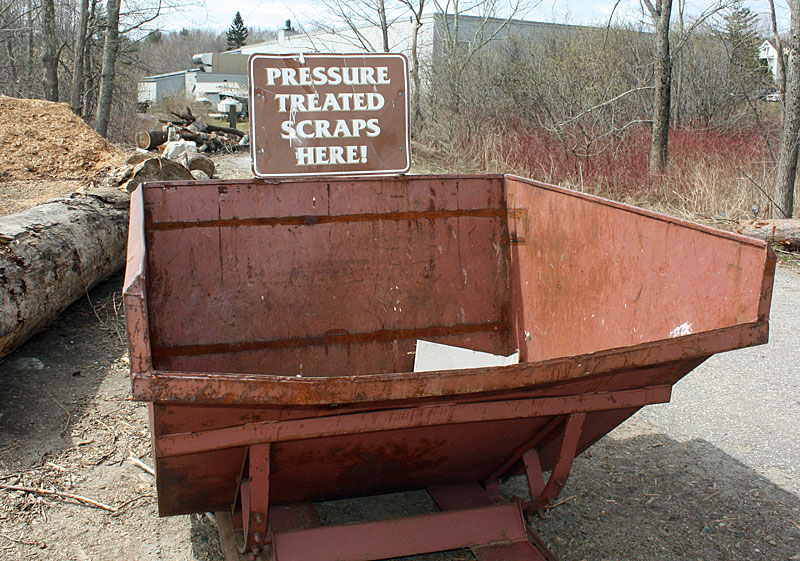 A bin next to the demolition wood pile is for pressure treated wood, which cannot be mixed in with the demo wood prior to chipping. (Photo by Holly S. Edwards)
A bin next to the demolition wood pile is for pressure treated wood, which cannot be mixed in with the demo wood prior to chipping. (Photo by Holly S. Edwards)
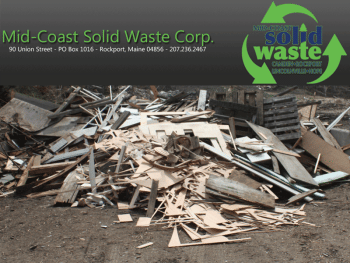 For the Mid-Coast Solid Waste Corp.’s demolition wood diversion program to work, people need to only place demolition wood on the pile. Not Blueboard or drywall, not plastic pipe, not iron or metal sheathing or by all means, not pressure treated wood. (Photo by Holly S. Edwards)
For the Mid-Coast Solid Waste Corp.’s demolition wood diversion program to work, people need to only place demolition wood on the pile. Not Blueboard or drywall, not plastic pipe, not iron or metal sheathing or by all means, not pressure treated wood. (Photo by Holly S. Edwards)
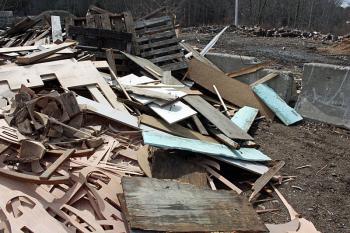 The transfer station’s demolition wood pile Tuesday morning contained sheets of Blueboard insulation, which the facility is asking people to be sure and not place in the pile. (Photo by Holly S. Edwards)
The transfer station’s demolition wood pile Tuesday morning contained sheets of Blueboard insulation, which the facility is asking people to be sure and not place in the pile. (Photo by Holly S. Edwards)
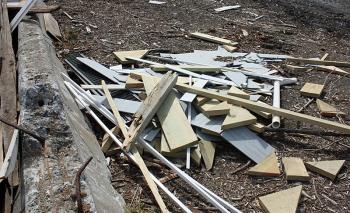 Mid-Coast Solid Waste Corp. manager Jim Guerra has started a secondary pile of non-demolition wood that people have put into the pile, and it contained a variety of disqualified components. (Photo by Holly S. Edwards)
Mid-Coast Solid Waste Corp. manager Jim Guerra has started a secondary pile of non-demolition wood that people have put into the pile, and it contained a variety of disqualified components. (Photo by Holly S. Edwards)
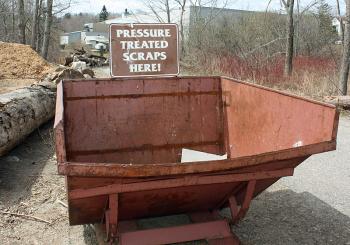 A bin next to the demolition wood pile is for pressure treated wood, which cannot be mixed in with the demo wood prior to chipping. (Photo by Holly S. Edwards)
A bin next to the demolition wood pile is for pressure treated wood, which cannot be mixed in with the demo wood prior to chipping. (Photo by Holly S. Edwards)
ROCKPORT – The transfer station in Rockport that serves the communities of Camden, Hope, Lincolnville and Rockport is seeking the public's help in properly sorting a very basic recyclable: demolition wood.
Demolition wood is not pressure treated, it's not plastic lumber or concrete board, it's not Blueboard or pink Styrofoam insulation and it's not metal or iron. It's wood, plain and simple. And it has value, which is why Mid-Coast Solid Waste Corp. Manager Jim Guerra said he is restarting the facility's demolition wood diversion program.
"In my estimation, 70 percent of the material in the landfill is demolition wood, and it would be a lot better to divert much of it from the trash stream and turn it into fuel," said Guerra. "And if I can get this program running well, I can drop the tipping fee to those bringing the material in."
Clean demolition wood will be chipped on site and hauled by tractor-trailer to licensed boilers for fuel.
Today, the tip fee for clean demolition wood is $60 per ton, compared to $80 per ton for mixed demolition debris. If we can lower our costs of making a product out of this material, we could go as low as $50 per ton. That means if you organize properly and make sure wood is properly sorted from other demolition debris, you can haul it in for a significantly reduced rate.
For the program to work, Guerra said people need to spend that extra time and properly sort out anything that is not wood but especially not pressure treated wood.
"One piece of pressure treated lumber can ruin a load of chipped wood, ready to be shipped out as fuel," said Guerra. "If you spend the time and energy chipping four tractor trailers full and they test the load before hauling it off and find any pressure treated wood in it, you have to eat the whole cost to chip it and they won't take it."
Guerra said that old pressure treated wood had high levels of arsenic in it, which was for many years the most common preservative applied to wood. Chromated copper arsenate is a chemical wood preservative containing chromium, copper and arsenic. CCA is used in pressure treated wood to protect it from rotting due to insects and microbial agents, according to the U.S. Environmental Protection Agency.
Since the 1970s, the majority of wood used in outdoor residential settings has been CCA-treated wood, but effective Dec. 31, 2003, pressure treated wood containing CCA is no longer allowed to be produced for residential uses, including outdoor decks and children's play sets.
But pressure treated wood is still around, especially as houses are renovated and time takes its toll on older outdoor wood structures. Pressure treated lumber is also commonly found as pallets, though not all pallets are pressure treated.
"The new pressure treated lumber does not have arsenic, but the test they use doesn't discriminate between old pressure treated wood. The reagent they use only indicates a copper content, yet, a positive result condemns the whole load," said Guerra. "The DEP plans to revisit this rule soon, but we are not waiting. Wood waste represents way too much of what we are landfilling to ignore and continue waiting."
"Economically and environmentally it makes sense for the contractor to separate the clean from the mixed debris and save some of the tipping fee we charge," said Guerra.
Out behind the big metal recycling building crews have set up an area specifically for the collection of demolition wood - with or without nails. Unfortunately, a visit to the pile Tuesday morning showed some large pieces of Blueboard insulation mixed in with the wood.
Off to the side was a pile of PVC plastic pipes, metal and pressure treated wood scraps.
"I have already been picking out the stuff that doesn't qualify," said Guerra. "And we'll be adding new signage to help people know what goes where."
Editorial Director Holly S. Edwards can be reached at hollyedwards@penbaypilot.com or 706-6655.
Event Date
Address
90 Union Street
Rockport, ME 04856
United States

